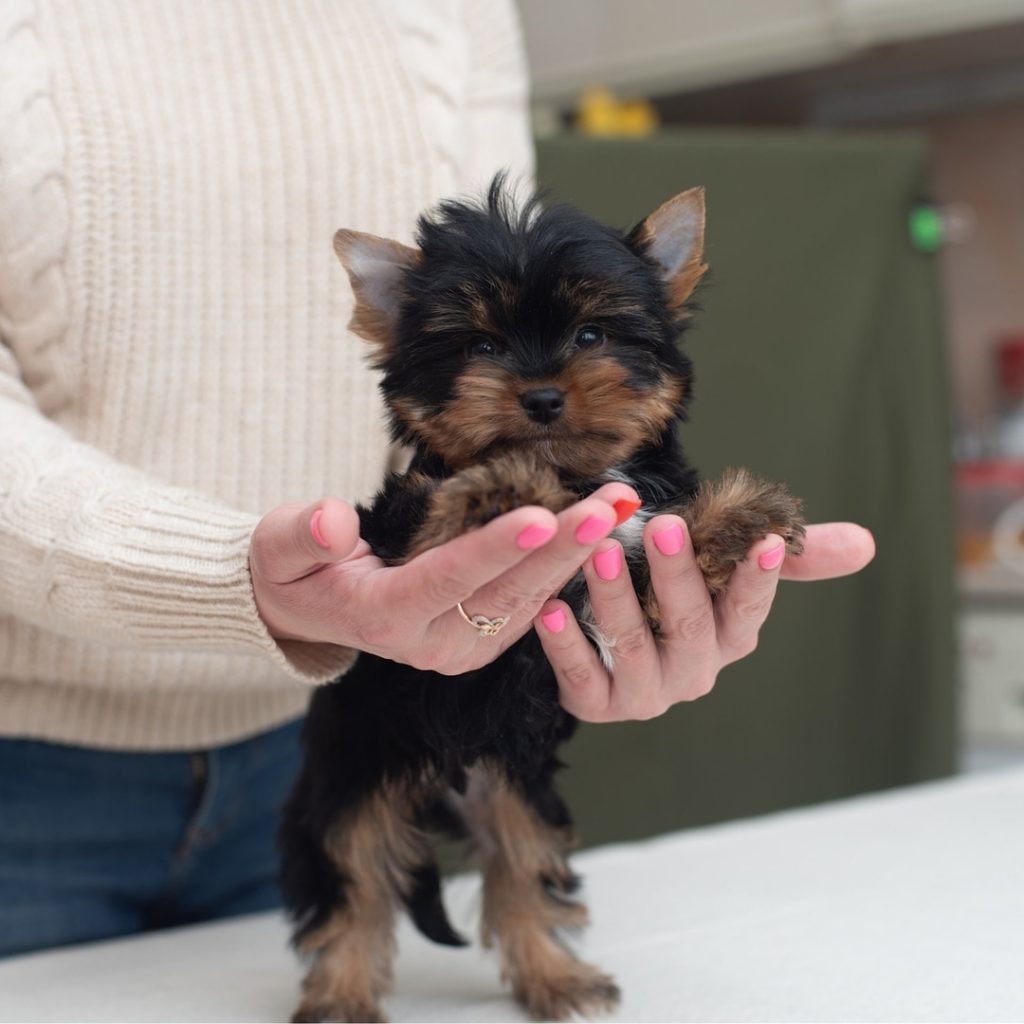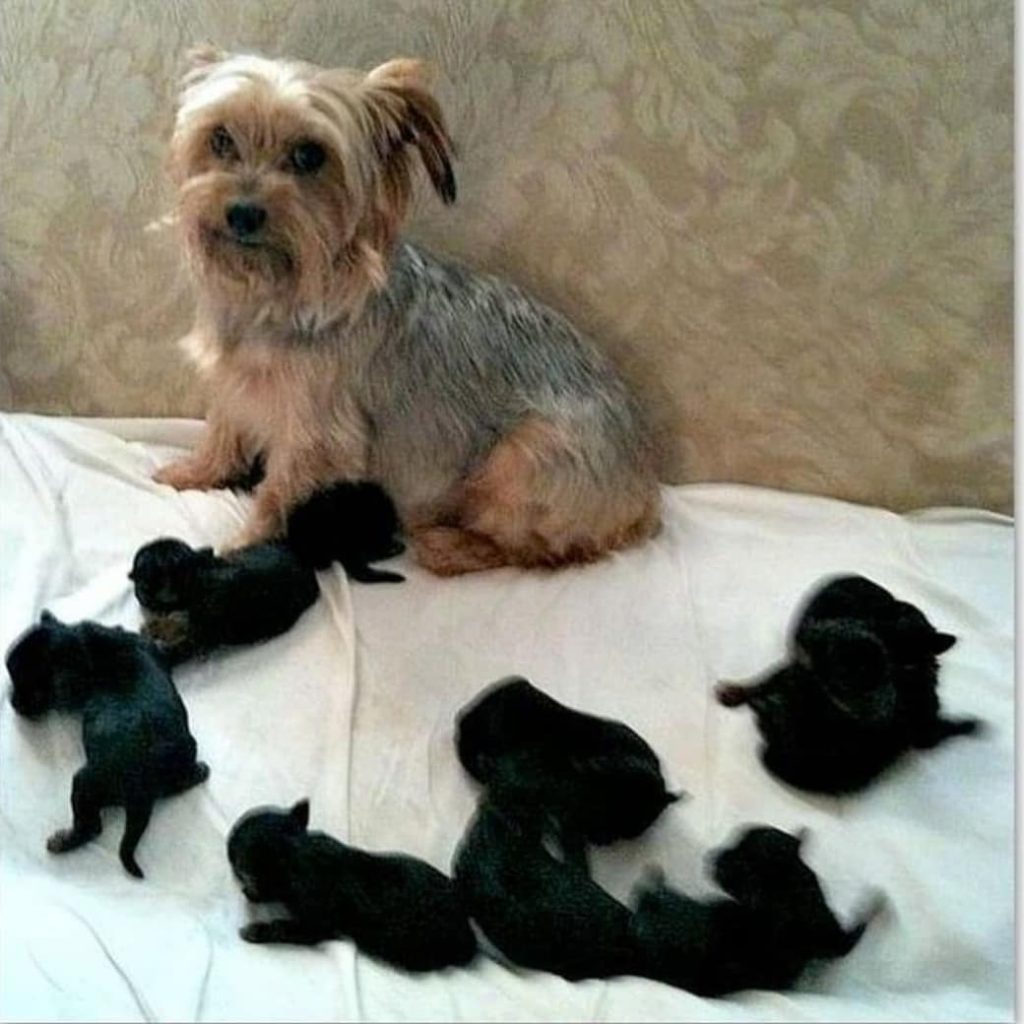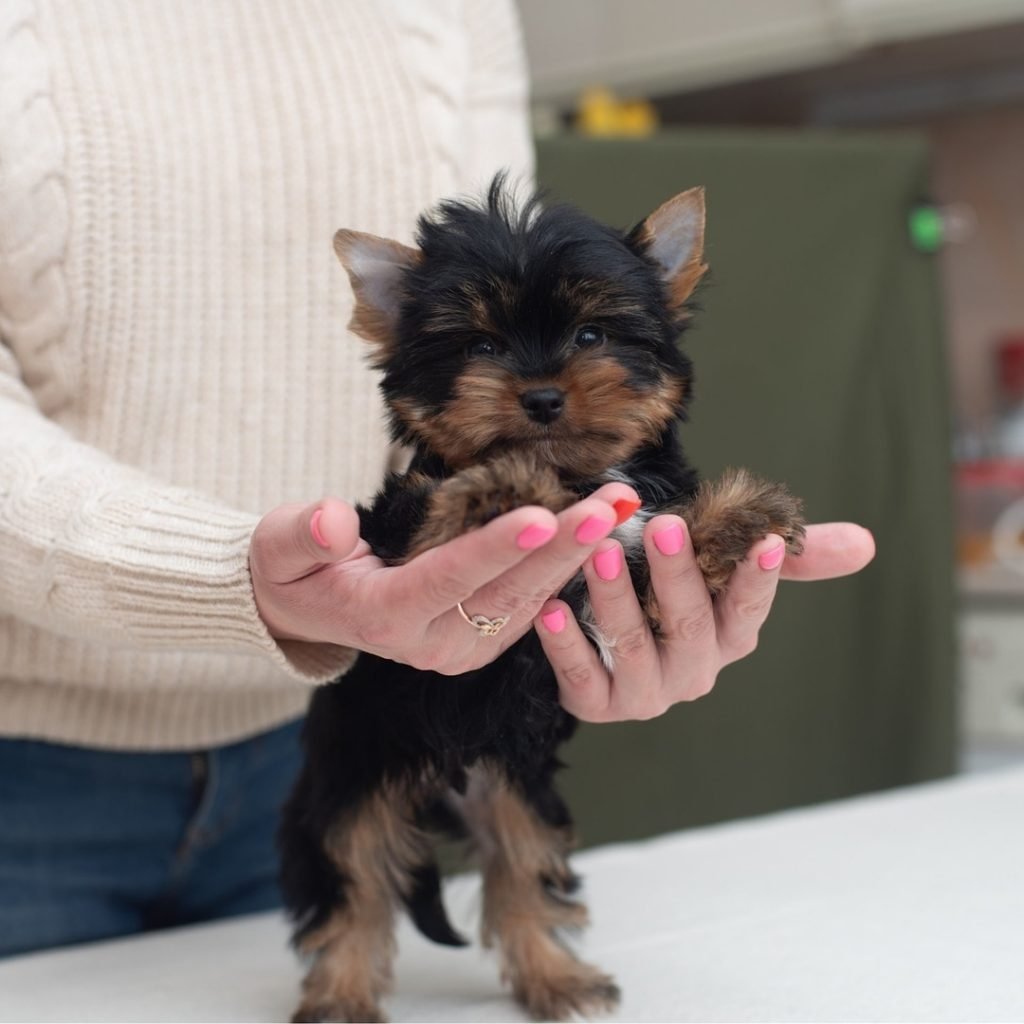Did you know that despite their small size, Yorkshire Terriers, or Yorkies, are known for having relatively large litters? These pint-sized pups can surprise you with the number of babies they can have!
Yorkies typically have litters of 2 to 5 puppies, with 3 being the average. However, it is not uncommon for them to have even more. In fact, the largest recorded litter from a Yorkie was a whopping 10 puppies! Despite their petite stature, these little dogs have a remarkable capacity for producing adorable bundles of joy.
With a history dating back to the 19th century in England, Yorkies have long been cherished as companion pets. These feisty and affectionate dogs have captured the hearts of many. As for their reproductive capabilities, Yorkies have retained their natural ability to reproduce and raise litters. Whether you are a breeder or a pet owner, it’s important to provide the necessary care and support during the pregnancy to ensure the health and well-being of the mother and her puppies. So, if you’re considering adding a Yorkie to your family, be prepared for the possibility of a delightful bundle of joy.

How Many Babies Can a Yorkie Have? – A Comprehensive Guide
Yorkshire Terriers, affectionately known as Yorkies, are popular small dog breeds that are cherished for their adorable looks and lively personalities. If you are considering breeding Yorkies or simply curious about their reproductive capacities, you may be wondering how many babies a Yorkie can have in a single litter. In this article, we will explore the factors that influence litter size, the average number of puppies in a Yorkie litter, and some important considerations for breeding Yorkies.
The Factors Influencing Litter Size
Several factors come into play when determining the size of a Yorkie’s litter. One of the main factors is the age and health of the female Yorkie. Generally, younger, healthier Yorkies tend to have larger litters than older or less healthy ones. Another crucial factor is the size of the dog. Yorkies come in different sizes, with teacup, toy, and standard sizes being the most common. Typically, teacup and toy Yorkies will have smaller litters compared to their standard-sized counterparts.
Age and Health of the Female Yorkie
As mentioned earlier, the age and health of the female Yorkie greatly influence the size of her litter. Younger dogs, generally between the ages of 1 to 5 years, have a higher chance of producing bigger litters. Older dogs, on the other hand, may experience a decline in fertility and have smaller litters. It is also essential to ensure that the female Yorkie is in good health before breeding. Regular veterinary check-ups, a balanced diet, and appropriate exercise can contribute to the overall well-being of the dog and potentially increase the chances of a larger litter.
Size of the Yorkie
Size matters when it comes to determining the number of puppies a Yorkie can have. Teacup and toy Yorkies, which are smaller in size, generally have fewer puppies in a litter compared to standard-sized Yorkies. Teacup Yorkies are the smallest and may often have litters consisting of only one or two puppies. Toy Yorkies, while slightly larger, still tend to have relatively small litters. Standard-sized Yorkies have the potential to have larger litters ranging from three to seven puppies, with the average being around four to five. It is important to note that these numbers are just averages, and individual cases may vary.
The Average Litter Size of a Yorkie
On average, a Yorkie will have a litter size ranging from three to five puppies. However, it is crucial to understand that this is just an average and that there can be significant variations. Some Yorkies may have smaller litters of one or two puppies, while others may have larger litters of six or seven puppies. The number of puppies in a litter is ultimately determined by various factors, including the health and age of the female Yorkie, size, and genetics.
Genetics and Breeding Techniques
Genetics also play a role in determining the size of a Yorkie’s litter. The genetic makeup of the parents can influence the litter size, as well as the overall health of the puppies. Breeding techniques, such as artificial insemination or selective breeding, can also be used to increase the chances of a larger litter. However, it is important to note that these techniques should be done responsibly and with the guidance of a professional breeder or veterinarian.
Considerations for Breeding Yorkies
Breeding Yorkies can be a rewarding but challenging endeavor. It is essential to consider various factors before deciding to breed your Yorkie or seeking a reputable breeder. Some of the key considerations include the health and temperament of the parent dogs, the ethical implications of breeding, and the availability of resources and time to care for the puppies. It is crucial to prioritize the well-being of the dogs and ensure that responsible breeding practices are followed. Consulting with a veterinarian or a professional breeder can provide valuable guidance throughout the breeding process.
Caring for a Yorkie During Pregnancy and Birth
Now that we have discussed the factors influencing litter size and the average number of puppies in a Yorkie litter, let’s shift our focus to the care needed for a pregnant Yorkie and the birth process.
Pregnancy Care for a Yorkie
When a Yorkie becomes pregnant, it is vital to provide her with the proper care and support. Here are some essential tips for ensuring a healthy pregnancy:
1. Veterinary Check-ups: Schedule regular check-ups with a veterinarian to monitor the dog’s health and the progress of the pregnancy.
2. Nutrition: Provide a balanced and nutritious diet specifically designed for pregnant dogs. Consult with a veterinarian for recommendations on the appropriate diet.
3. Exercise: Moderate exercise is beneficial for a pregnant Yorkie, but avoid high-impact activities or excessive physical strain.
4. Comfortable Environment: Create a comfortable and quiet space for the pregnant Yorkie to rest and relax.
5. Stress Reduction: Minimize stressors and provide a calm and stress-free environment for the expecting mother.
The Birth Process
The birth of Yorkie puppies, also known as whelping, is a critical and delicate process that requires careful monitoring. Here are some important things to know about the birth process:
1. Nesting: The pregnant Yorkie will begin nesting, preparing a comfortable area where she will give birth. Provide her with a whelping box or a secluded space.
2. Labor Signs: Signs of labor include restlessness, panting, and contractions. Monitor the Yorkie closely for these signs.
3. Assistance: Most Yorkies are capable of giving birth without assistance. However, if you notice any difficulties or prolonged labor, seek veterinary assistance immediately.
4. Post-Birth Care: The mother will take care of cleaning and stimulating the puppies. Ensure a warm and clean environment for the newborns.
Common Concerns and FAQs
What Are the Risks of Breeding Yorkies?
While breeding Yorkies can be a rewarding experience, it is essential to be aware of the potential risks and complications that can arise. Some common risks include:
1. Pregnancy complications such as eclampsia or pyometra.
2. Difficulty during labor and need for veterinary intervention.
3. Genetic health issues that can be passed on to the offspring.
4. Increased responsibility and commitment to caring for the mother and puppies.
It is crucial to thoroughly research and consult with professionals before deciding to breed Yorkies.
Is It Ethical to Breed Yorkies?
Breeding dogs, including Yorkies, carries ethical considerations. It is essential to prioritize the well-being and health of the dogs, avoid irresponsible breeding practices, and promote responsible pet ownership. Responsible breeding involves proper health screening, meeting breed standards, and ensuring the puppies find loving and suitable homes.
Can Yorkies Have C-Sections?
Like many small dog breeds, Yorkies can be prone to difficulties during labor, such as a small pelvis or large puppies. In such cases, a cesarean section may be necessary to safely deliver the puppies. It is crucial to consult with a veterinarian for guidance and to be prepared for the possibility of a C-section.
In summary, the number of puppies a Yorkie can have in a litter is influenced by various factors, including the age and health of the female Yorkie and the size of the dog. On average, a Yorkie will have a litter size ranging from three to five puppies. Responsible breeding practices, regular veterinary care, and proper nutrition and care during pregnancy are essential for ensuring the well-being of both the mother and the puppies. Remember, breeding should always be approached with care and responsibility.
Key Takeaways: How Many Babies Can a Yorkie Have?
- A female Yorkie can have a litter size ranging from 1 to 5 puppies.
- On average, Yorkies typically have 3 to 4 puppies per litter.
- The size of the litter can be influenced by various factors such as the female’s age and health.
- Yorkies are known for their small size but can still have a fair number of puppies.
- It is important to provide proper care and assistance during the birthing process to ensure the well-being of both the mother and the puppies.
Frequently Asked Questions
Welcome to our FAQ section on Yorkie pregnancies! Below, you will find answers to some common questions about how many babies a Yorkie can have. If you’re a Yorkie owner or considering getting one, this information will be beneficial to you. Let’s dive right in!
1. What is the average litter size for Yorkies?
The average litter size for Yorkies ranges from 2 to 5 puppies. However, it’s important to note that smaller Yorkies tend to have smaller litters. Factors such as the size and age of the mother, as well as genetics, can influence litter size.
Keep in mind that while 2 to 5 puppies is the average, there can be cases where a Yorkie has a larger or smaller litter. Each pregnancy is unique, and individual variations can occur.
2. Can a Yorkie have a litter of only one puppy?
Yes, it is not uncommon for a Yorkie to have a litter of only one puppy. This is known as a singleton litter. The reasons for a singleton litter can vary and may be influenced by factors such as the mother’s age, health, or breeding conditions.
While singleton litters are less common, they are still a possibility for Yorkies. If your Yorkie is pregnant and only has one puppy, it doesn’t necessarily indicate a problem. However, it’s always a good idea to consult with a veterinarian to ensure the health and well-being of both the mother and the puppy.
3. Can Yorkies have large litters with more than 5 puppies?
While it’s less common, Yorkies can have larger litters with more than 5 puppies. Some Yorkies may even have up to 8 or 9 puppies in a litter. However, larger litters are generally more common in larger dog breeds.
If your Yorkie is pregnant and you suspect she may have a large litter, it’s important to provide her with proper prenatal care and consult with a veterinarian. Larger litters can pose additional health risks for both the mother and the puppies.
4. Are there any factors that can affect the size of a Yorkie’s litter?
Yes, several factors can influence the size of a Yorkie’s litter. These factors include the age and size of the mother, genetics, overall health, and the conditions under which the breeding took place. Additionally, the size of the litter can also be affected by the number and quality of eggs released by the mother during ovulation.
It’s important to note that while these factors can play a role in litter size, individual variations can occur, and there may be cases where a Yorkie’s litter size deviates from the norm.
5. How long is the gestation period for Yorkies?
The gestation period for Yorkies is generally around 63 days, although it can vary by a few days. During this time, it’s important to provide the mother with proper nutrition, exercise, and regular veterinary check-ups to ensure a healthy pregnancy and delivery. It’s also crucial to create a comfortable and safe environment for the mother and her upcoming puppies.
If you suspect your Yorkie is pregnant, consult with a veterinarian to confirm the pregnancy and receive guidance on how to best care for your expectant furry friend.

Summary
Yorkies can have varying numbers of puppies, but the average litter size is around three to five. However, it is crucial to remember that every dog is different, and some Yorkies may have fewer or more puppies. Proper care and regular vet check-ups are essential for their health and the health of their puppies. Always consult with a reputable breeder or veterinarian for more specific information about your Yorkie’s pregnancy.
Taking care of a pregnant Yorkie requires providing a balanced diet, plenty of exercise, a safe and comfortable environment, and regular veterinary care. It’s important to be prepared for the possibility of complications during birth and to know when to seek professional help. Remember to give your Yorkie and her puppies love, attention, and care throughout the pregnancy and beyond.
